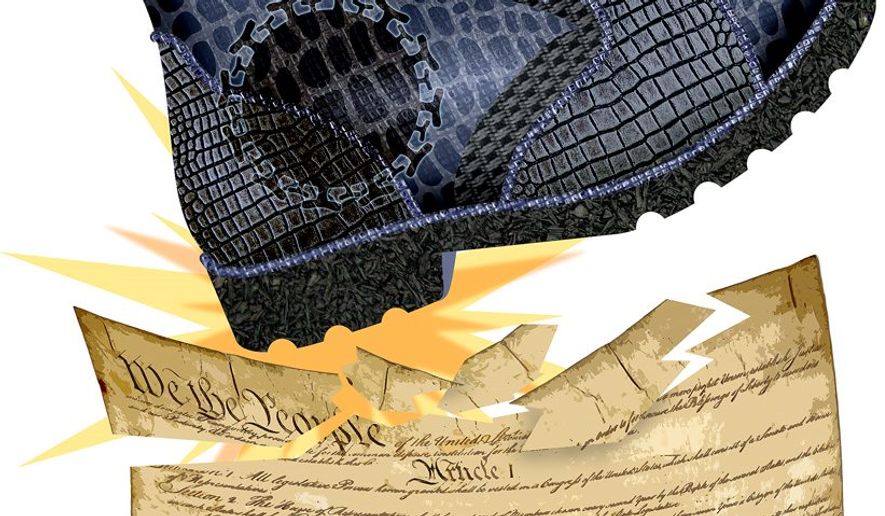OPINION:
Demonstrators in Michigan, Illinovis, Wisconsin, California and other states demanding that the COVID-19 restrictions on the way they live their lives so they can earn a living and avoid economic ruin have been condemned by many as short-sighted because we have not yet rid the country of the virus.
Indeed, anyone desiring a return of the rights and freedoms most Americans crave are dismissed as know-nothings or deplorable Trumpsters rather than citizens who have legitimate needs and real questions about what is and isn’t needed to overcome the health and economic challenges we face.
It should be borne in mind that these restrictions were put in place not to “defeat” the virus, but to “flatten the curve” so that the nation’s hospitals wouldn’t be overwhelmed by a crush of victims. It was assumed from the beginning that these measures might not lessen the number ultimately infected or even the total number who might die, but would spread the numbers out over a longer period of time to allow existing and emergency medical facilities to operate efficiently.
Actually “defeating” the virus would come only if private and public laboratories here or elsewhere are able to develop a “vaccine” to protect people or enough people are infected to create what the professionals call “herd immunity.” This means that the percentage of potential victims who have developed anti-bodies increases to a level that makes it difficult if not impossible for the virus to find new victims or hosts.
The lockdowns in place in many states and countries seem to have worked as the experts expected by “flattening the curve” making early panicked predictions of how many hospital beds and ventilators might be needed moot. Indeed, some of the emergency treatment facilities thrown up as the pandemic began its relentless spread are already being dismantled as unneeded. The problem with the approach taken was that it essentially shut down the economy, destroyed jobs and pushed the day when life can return to normal further into the future.
The president, economists and many governors are anxious to begin loosening the restrictions under which Americans are living to avoid an economic crash such as we haven’t seen since the Great Depression. The longer the economy is shut down, the harsher the consequences for business and for Americans who want to get back to work. If it goes on long enough, in fact, it may turn out that the “cure” will turn out to be more deadly that the disease it has been instituted to combat.
When one adds in the fact that many of the rules being imposed by government fiat make little sense to those forced to live with them has concerned civil libertarians and men and women who don’t understand — for example, why if they live in Michigan they can go to the store to buy electronic equipment or pot, but not garden seed or house paint. Or why California police would issue thousand-dollar tickets to people sitting alone in their cars to enjoy the sunset. Or why some governors are attempting to ban any protest of their actions with threats of arrest and jail sentences.
It may be that few of the governors or mayors issuing such orders have, like a few of their predecessors, little understanding of the rights Americans have enjoyed since the founding. Acting out of a sincere desire to keep people safe or using the cover of the pandemic to simply ban the sale of products they don’t like, they seem ignorant of the constitutionally protected rights they are trampling on. The more “progressive” among them may have the sort of disdain for the U.S. Constitution expressed almost proudly last week by New Jersey Gov. Philip Murphy dismissed such concerns by declaring that “The Bill of Rights is above my pay grade.”
Others are questioning the need for the draconian measures taken by some states and the question that remains unanswered is whether all of this is really necessary. Eight states have refused to take the most stringent measures that mayors like New York’s Bill de Blasio or governors like Michigan’s Gretchen Whitmer have taken. They are Arkansas, Iowa, Nebraska, North and South Dakota, Oklahoma, Utah and Wyoming. The governors of each of these states have ordered some businesses such as restaurants closed, but relied on their citizens to act with common sense to protect themselves, their families and others by maintaining “social distancing” and the like.
A new academic study of the cases and deaths per million residents of each state that takes population density and other factors into consideration reveals that these states are doing as well or better than those that have imposed the severest restrictions on their citizens raising the question of whether such measures have done much good. If not, there can be no logical or other rationale behind using the state police power to harass citizens exercising their constitutional rights or to order them to give up those rights by fiat in the name of public health.
• David A. Keene is an editor at large for The Washington Times.




Please read our comment policy before commenting.